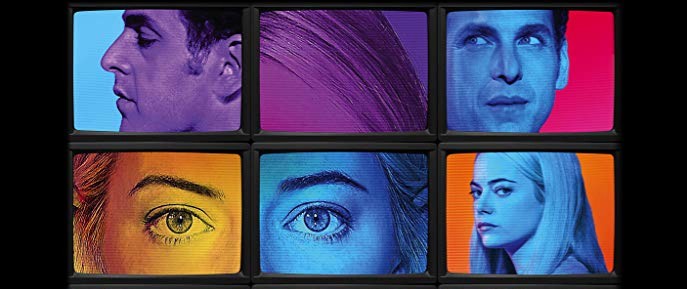
Last Friday, Netflix released a new series called Maniac. Following up on Black Mirror and Stranger Things binges, Maniac has already flickered across many TV-lovers’ screens. The format is limited to ten episodes and based on the, four years older, Norwegian series with the same name. This genre-bending sci-fi drama is written by Patrick Somerville and directed by Cary J. Fukunaga, who directed the first season of True Detective and is known for his unique imagery, is a journey worth taking.
After the first episode it is hard not to be confused. Somerville dives right into the complex plot without letting the viewer know what is going on. In fact it might take until the fourth episode to fully wrap your mind around the story, but do not worry this “multi-reality-brain magic-shit” will keep you watching easily.
Maniac is set in what appears a futuristic version of the 1980s New York City, with small robots cleaning dog poop off the streets and Add Buddies which allow you to watch a few adds instead of paying money for small purchases. A dystopian world, where actors can be rented to play friends and true human connection is rare.
In this world the shy Owen Milgrim, Jonah Hill, is at home. He is the black sheep of his wealthy New Yorker family, which excludes him because of his unacknowledged mental issues, even going as far as not painting him into the family portrait. Owen remains at distance especially with his show off brother Jed. Owen’s schizophrenia and delusions go so far, that he is not able to tell what’s real and what’s not. It is not unusual for him to see a corn kernel turn into popcorn on the bare asphalt or to have conversations imaginary version of his brother Jed. When Owen gets laid off at work he refuses his family’s offer to help him out and instead relies on an experimental drug trial to stock up his funds.
At the trial Owen meets Annie, Emma Stone, a twenty-something who blackmailed her way into the trial because she is addicted to the rare medicine that will be tested. Annie, like Owen experienced a family trauma. Her mother disappeared when she was a child on top of that her sister recently died in a car crash while she was driving. After these tragedies Annie picked up the, more than recreational, use of the A-pill, one of the three pills making up the experiment.
Amongst other subjects Owen and Annie enter the laboratory, the doctors introduce themselves, one constantly smoking and the other a drug addict, and it is clear that this experiment will not go as expected. The volunteers each ingest three pills, called A,B and C, and with the help of computer “Gertie” they undergo fantasy journeys in their own minds. Meanwhile Gertie collects information and builds a new defence system, which is supposed to fix the human mind and to eradicate sadness.
Due to a malfunction the two main characters repeatedly find themselves living out fantasies together. These vary from being a trashy Long Island couple on a heist for a lemur, to chic thieves competing for the same treasure at a 1940s séance party, or an elf ranger and a mafia boss.
Things really get out of hand when Gertie goes rouge. The uncontrollable Artificial Intelligence wants to trap Annie in her computer-generated dream world to keep her company, which would lead to brain death in the real world. Owen sets out on a quest inside the mind trying to rescue Annie from the computers dangerous grip.
The story takes a few absurd turns, a depressed computer, an alien invasion, the doctor’s mother issues, wildly making out in an elevator, and a Jonah Hill speaking in a strange Icelandic/Scottish accent.
At the end of the trial Owen and Annie part ways, and even though the experiment itself was a failure, the two main characters are now a bit more aware of their issues and how to handle them. But Owen’s family has him hospitalised for schizophrenia, making him question if Annie and the entire drug trial were real. Finally Annie shows up in person to break him out of the clinic and he knows he has found a real friend.

Maniac feels like a comedian who makes a good joke but is insecure enough, to feel the need to go back and explain it to the audience. The series is desperately trying to be a mind-fuck show, but adding in a touch too much of the “did you see what I did there” vibe. Never the less Emma Stone’s acting will make up for those moments with her heartwarming performance.
Stone is portraying the erratic and angry, yet insecure, Annie with grandeur. She comes to life, as the slightly trashy gum chewing Linda and the role of the drunken elf ranger seems to be written for her. Only in the action shootout we cannot quite believe the, never seen before, stunt-pulling-multiple-gun-shooting heroine Emma Stone. But we totally forget about that at the peak of Stone’s performance in Maniac, the emotional scenes, in which she pours her heart out talking about the loss of her mother and sister.

Jonah Hill’s character, on the contrary to Annie, is less defined by his personality, but more by the absence of one. Hill is pulling off the shy and depressed man without a doubt – his performance is unbelievably believable. But the actor struggles to slip into the very divers fantasy alter egos of his character, like the Mohawk-wearing Bruce, or the Mafia Gangsta with long braids. Hopping back and forth between not only different characters but also different genres is a task. Still Hill’s acting is by no means bad, his performance as the introverted Owen merely outshines the others.
From behind the scenes Fukunaga created some beautiful images, wether it is the interview room full of blue screens showing close ups of the subjects faces, or the neon lit laboratory. We might recognise Lord of the Rings like fantasy worlds, still the visuals of Maniac are truly eye pleasing and fun to watch.
Amongst the many spinning wheels of Maniac it is hard not to get a little lost. Writer Patrick Somerville tries hard to answer the many questions posed, not the least of it why the human mind would need “fixing” in the first place, but however the series still lacks explanations. When it all boils down to an utterly happy ending we almost expect something to go wrong. It seems just a touch too easy to simply drive off into the sunset after all of the struggles Owen and Annie had to undergo throughout the series. Never the less the story’s message is encouraging; even in the most desperate of times there are people out there who you can connect with.
Maniac is meant to be completely over the top and a bit absurd. Its bizarre twists and plot lines will make you laugh out loud, but some scenes might have you wondering wether this is just a hint too ridiculous to be true. Over all this miniseries is no doubt entertaining although it does not leave the mark on the viewers’ minds, it would like to.
![]()
![]()
![]()
![]()
![]()
THREE AND A HALF STARS (OUT OF FIVE)
Maniac is screening on Netflix now.
